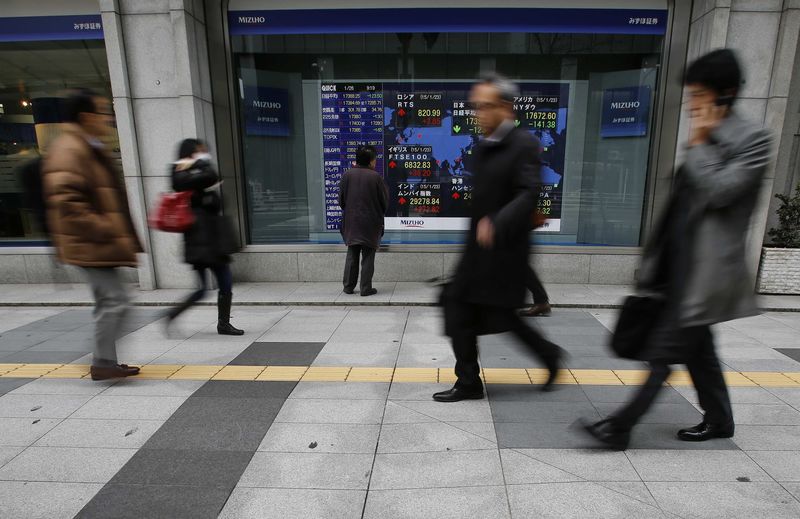Gold prices edge lower; heading for weekly losses ahead of U.S.-Russia talks
* China agriculture delegation scraps U.S. farm visit to
Montana
* MSCI world equity index slips
* Central bank easing helps risk sentiment but trade
tensions hurt
* Treasury yields fall; dollar slips vs yen
* Oil prices edge higher
(Updates to U.S. afternoon trading)
By Saqib Iqbal Ahmed
NEW YORK, Sept 20 (Reuters) - An index of global stock
markets gave up early gains after Chinese agriculture officials
who were to visit U.S. farm states next week canceled their
trip, dampening optimism on U.S.-China trade talks.
Revived worries about the state of the ongoing trade
tensions between Washington and Beijing drove Treasury yields
lower and pushed the U.S. dollar down against the safe-haven
Japanese yen.
Stocks had started the day stronger as stimulus measures by
major central banks eased worries about growth. But optimism
faded following the report that the Chinese officials canceled
their visit. The cancellation came as U.S.-Chinese trade talks were held
in Washington and U.S. President Donald Trump said he wanted a
complete trade deal with the Asian nation, not just an agreement
for China to buy more U.S. agricultural goods.
The MSCI world equity index .MIWD00000PUS , which tracks
shares in 47 countries, was 0.07% lower.
On Wall Street, stocks, which had started the day strong
following China cutting a key lending rate for the second
straight month, reversed course on the news of the canceled
farm visits.
Equity markets have largely welcomed the central bank moves
in recent days, including interest rates cuts by the European
Central Bank and the U.S. Federal Reserve.
"It's trade-related and markets are just hyper-sensitive to
trade," said Paul Nolte, portfolio manager at Kingsview Asset
Management in Chicago.
For the week, the S&P 500 and the Nasdaq were set to end
slightly lower, their first weekly loss in four weeks.
The Dow Jones Industrial Average .DJI fell 50.81 points,
or 0.19%, to 27,043.98, the S&P 500 .SPX lost 5.33 points, or
0.18%, to 3,001.46 and the Nasdaq Composite .IXIC dropped
44.04 points, or 0.54%, to 8,138.84.
The pan-European STOXX 600 index .STOXX finished up 0.29%,
after giving up some of the gains logged earlier in the session.
Increased concerns that the United States and China are
unlikely to forge a trade deal in the near term drove U.S.
Treasury yields lower. Benchmark 10-year notes US10YT=RR gained 5/32 in price to
yield 1.7579%, down from 1.774% on Thursday.
Bonds were also supported after the New York Federal Reserve
said it plans to pour cash into the U.S. banking system through
early October to avert another market disruption, after the cost
of loans in the overnight repurchase agreement (repo) market
soared to 10% on Tuesday. In foreign exchange markets, the dollar fell sharply against
the yen as investors weighed the latest developments on the
U.S.-China trade front.
The yen tends to attract demand in times of market stress as
the currency is backed by Japan's current account surplus, which
offers it more resilience than currencies of deficit-running
countries.
The dollar was 0.27% lower against the Japanese currency.
Against a basket of major currencies .DXY , the greenback was
up 0.24%. Oil prices edged higher, with Brent set for its biggest
weekly gain since January, lifted by rising Middle East tensions
and supply concerns after an attack on Saudi Arabia's energy
industry last weekend.
"The question is, 'Can they convince the market that they
can keep their oil fields safe?'" said Phil Flynn, an analyst at
Price Futures Group in Chicago, in a note.
At 1826 GMT, U.S. crude CLc1 fell 0.07% to $58.09 per
barrel and Brent LCOc1 was last at $64.41, up 0.02% on the
Lingering tensions in the Middle East along with increased
worries about the trade tensions supported gold, and the yellow
metal was on pace for its first weekly rise in four. Spot gold
XAU= was up 0.81% at $1,511.21 an ounce.
Graphic: World FX rates in 2019 http://tmsnrt.rs/2egbfVh
^^^^^^^^^^^^^^^^^^^^^^^^^^^^^^^^^^^^^^^^^^^^^^^^^^^^^^^^^^^>
